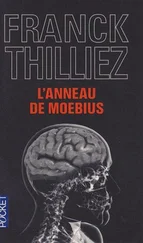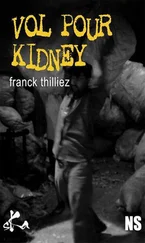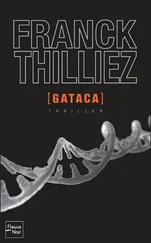He had a very bad intuition.
Inside, he found only a photo.
It showed Lucie Henebelle and himself coming out of his apartment. The morning after the night they’d spent here.
Lucie’s head was circled in red marker.
Sharko leaped onto his cell phone and punched in the woman’s number.
Still no ring, as if the number simply didn’t exist.
It was them. Sharko was certain of it. Somehow or other, they had neutralized the SIM card of her cell phone.
The next moment, with trembling fingers, he dialed the number of the Delta Montreal. The hotel staff informed him that there was no one in Mme. Henebelle’s room; the key was still at reception. Sharko told the operator that he had an urgent message for Lucie Henebelle, that she absolutely had to call him the moment she returned.
He’d thought he was putting her out of harm’s way by sending her across the ocean.
But he had completely isolated her.
Thrown her into the lion’s den.
Half an hour later, not knowing what else to do, he knocked at Martin Leclerc’s door in the twelfth arrondissement, near the Bastille.
It was not quite two in the morning.
At a little after six in the evening, Lucie was sitting across from the archivist, in the alcove that smelled of old papers and distant history. Patricia Richaud nervously fingered her pendant of the Virgin Mary, while Lucie skimmed down the list of nuns still present at La Charité Hospital. A peculiar atmosphere reigned in that forgotten lair, at once heavy and tense.
Lucie stabbed her finger at the list.
“She’s still there. Sister Marie du Calvaire. Eighty-five years old. She’s still alive.”
She sat back in her chair with a sigh of relief. This aged woman had lived with Alice Tonquin. She must know at least part of the truth.
Satisfied, Lucie focused her attention. Patricia had begun speaking.
“In the years you’re asking about, they did not forgive a woman for giving birth out of wedlock. Mothers who did not observe that norm were treated as pariahs, sinners. Their own parents rejected them. Because of this, pregnant young women tried every means to hide their sin, often leaving their home for several months so they could give birth in secret behind the walls of the convent.”
Lucie unconsciously circled the name “Alice Tonquin” in her small memo book. She couldn’t get the little girl’s face out of her mind; she knew that the old film she’d watched that first day, in her ex-boyfriend Ludovic’s private cinema, would continue to haunt her for a long time.
“They abandoned their children there,” she murmured.
Richaud nodded.
“Yes, the baby was then taken in by the nuns. The idea was that the orphan would later be raised by a good family, that it would have every chance in life. But starting with the economic crash of the thirties, the adoption rate plunged. Most of those children grew up and remained in the institutions. So they had to build more day cares, convents, orphanages, and hospitals. The Church began to carry more and more weight in the government. Gradually, it increased its influence over institutions such as health services, education, public welfare… The Church was everywhere.”
Lucie had barely seen any of Montreal, but she’d noticed the countless religious monuments next to the offices of IBM and major financial corporations. A city marked by a weighty Catholic past, which neither modernism nor capitalism managed to obscure.
“When Maurice Duplessis came to power in 1944, it was the start of a critical period in Quebec’s political history. People would later call that period the ‘Great Darkness.’ The Duplessis administration was first and foremost about anticommunism, the use of strong-arm tactics against trade unions, and an invincible political machine. His party often enjoyed the very active support of the Roman Catholic Church in electoral campaigns. And you know how powerful the Church is, miss…”
Lucie pushed Alice’s photo toward the librarian.
“And what does this have to do with these orphans? How is this little eight-year-old girl involved in all this?”
“I’m getting to that. Between 1940 and 1950, the children placed in orphanages came, for the most part, from broken families that couldn’t afford to keep them. The families paid fees to the orphanages to raise their progeny, fees that were much higher than the state allocations. Up to that point, the system worked reasonably well; the Church took in the money and used it to develop its charitable activities. But the mass arrival of illegitimate orphans posed a serious problem: first of all, they filled the institutions beyond capacity, but worse than that, no one was paying for them, other than the federal government, which offered an absurd daily allowance of seventy cents per child. Understand that these illegitimate children had to be housed, fed, and given the education that every human being has a right to. With such limited financial resources, and despite everything, the nuns still tried to raise and educate these orphans in hardship and poverty. Whatever eventually happened, no one can blame them for their courage. They weren’t responsible…”
She paused a moment, her eyes staring into space, before resuming her explanation.
“Alongside that, in 1950, the Church built Mont Providence Hospital, a school that specialized in the education of orphans with slight intellectual deficiencies. The aim of the institution was to educate those children and help foster their integration into society. But in 1953, the hospital was on the verge of bankruptcy. The religious communities had gone more than six million dollars into debt to the federal government, and the government was demanding repayment. The nuns found themselves at an impasse, so they called on the provincial government. And it was at that point that everything changed, that the hell began, and Quebec would know what is certainly the darkest period in its history.”
Lucie listened carefully. Once again they were smack in the period of her search, the early fifties. Despite the dampness of her skin, she couldn’t repress a shiver. Patricia Richaud was now talking in a cold, almost didactic voice.
“Maurice Duplessis authorized a maneuver allowing that hospital, which was only for the slightly retarded, to be turned into an actual insane asylum. Why? Because in an asylum, the daily allowance paid by the federal government goes from zero to two dollars and twenty-five cents per person. Because in an asylum, there’s no obligation to hold classes, and so they could do away with spending money on education. Because having the status of psychiatric hospital allowed them to use those children as free labor, without regard for human rights. The healthy children took care of the sick ones, bathed them, cooked their meals, assisted the nuns, nurses, and doctors. And so, overnight, the boarders at the special school of Mont Providence suddenly became inmates in a hospital for the insane.”
Insanity… madness… The wave of children who suddenly started massacring animals, their eyes filled with incomprehensible hatred. Lucie felt her muscles stiffen.
“At that point, a whole monstrous system was set in place. The government promoted the construction of new psychiatric hospitals or transformed existing establishments into asylums. Saint-Charles-de-Joliette, Saint-Jean-de-Dieu in Montreal, Saint-Michel-Archange in Quebec, Sainte-Anne in Baie-Saint-Paul, Saint-Julien in Saint-Ferdinand d’Halifax… and that’s not all of them. Those illegitimate orphans, whom no one knew what to do with, became the unfortunate victims of the Duplessis government. The nuns in those places were powerless. They had no choice but to bow to the regulations dictated by their mothers superior.”
Читать дальше












